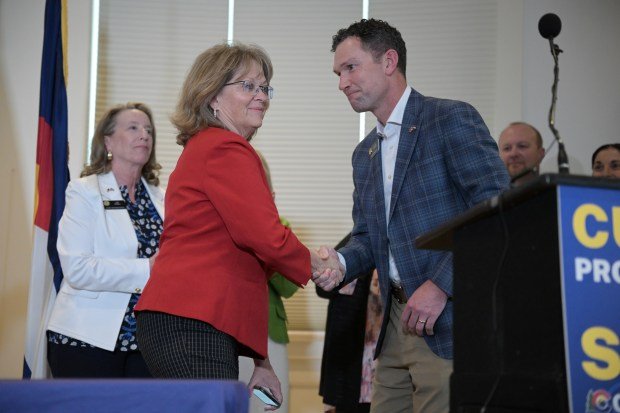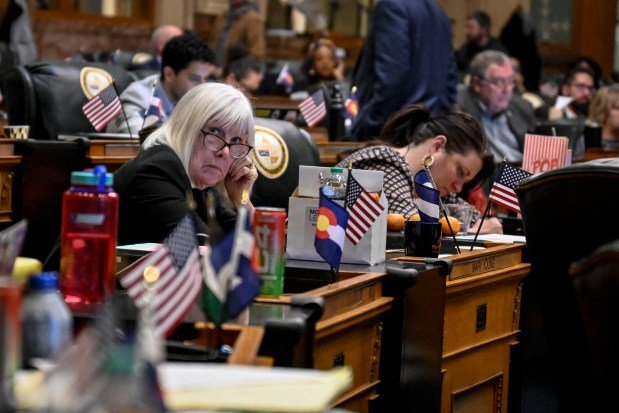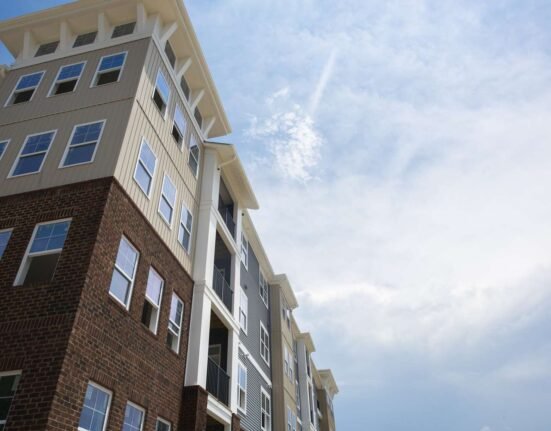After years of sparring over property tax rates, leading Colorado Democrats and conservative activists finally see an offramp from the conflict.
To get there, it will only have taken two special sessions, annual short-term bills at the Capitol, multiple threats of ballot measures and a failed attempt to override the Taxpayer’s Bill of Rights.
The latest bid for peace materialized Thursday, when Gov. Jared Polis announced he would call the legislature back for another special session — the second since last November — at the end of the month. If state lawmakers pass additional property tax cuts in the multiday session that starts Aug. 26, a conservative group has agreed to withdraw two ballot initiatives filed for the November election that would go much farther.
“We want to find ways to remove the uncertainty around (property taxes) for the medium term,” Polis said, noting fears that deeper cuts like those proposed in the ballot measures would gut school budgets. “In many ways, this is the last step of replacing the Gallagher Amendment.”
The governor’s move left state lawmakers and advocates determined to finally bury the hatchet after years of battles in the fallout of voters’ repeal of the Gallagher Amendment in 2020. That law for decades had held residential and non-residential taxes in a fixed ratio, providing stability for homeowners while increasing the burden on small businesses and throttling some local governments’ budgets. Its repeal introduced more volatility on the residential side.
Some lawmakers, though, have vented frustration about once again being called to debate an issue that they thought had been settled three months ago.
The new proposal, publicly unveiled at a legislative commission Monday as pressure for a special session increased, would build on an earlier property tax relief deal passed during the regular legislative session in May. That agreement cut property tax rates and established a cap on how much property tax revenue could grow year-over-year — in effect, cutting tax collections by an estimated $1.3 billion per year statewide.
This latest settlement would tighten those caps and rates even more and add an estimated $270 million to that cut.
In exchange, Advance Colorado has agreed to withdraw its two ballot initiatives, which would institute far steeper property tax reductions and growth constraints. If either were to pass in November, those measures would force state leaders to backfill some of local entities’ and schools’ lost revenue. That would require hundreds of millions of dollars in “catastrophic” reductions to the state budget in the coming years, officials said.
Though polling shared with Democratic legislators suggested Initiatives 50 and 108 faced a rocky road to success in the Nov. 5 election, the risk of them passing — and the budget cuts they’d require — was sufficiently serious to spark a deal, Polis and legislators said.
That wasn’t a sentiment universally shared by Democratic lawmakers, some of whom felt 50 and 108 were headed for failure in November. To them, striking a deal with the initiatives’ backers sets a concerning precedent: Spend the money to get a budget-busting initiative on the ballot, and you can force the legislature to the negotiating table.
The ballot measures “are absolutely so catastrophic, which is why everybody needed to put boots on the ground” to fight them at the ballot box — “not … go in and cut further revenue for our communities,” said Rep. Lorena Garcia, an Adams County Democrat.
But for property owners, policymakers and local governments, the tentative agreement will — hopefully — bring stability into a system that has tottered as lawmakers grappled with skyrocketing property values, people involved in the negotiations say.
While the initiatives would have saved property owners hundreds of dollars per year, the proposed legislative deal would reduce tax bills — or at least blunt their growth — by a more modest $100 or so per year for the owner of a $500,000 home in an area with an average mill levy.
To pass it, the concerns now lie in finalizing the details and maintaining trust between factions more used to power politics.

Goals are aligned, but is that enough?
Sen. Chris Hansen, a Denver Democrat and a chief sponsor of property tax bills since the repeal of Gallagher, put the goal of the special session in no uncertain terms: The “end of the property tax wars.”
“That’s what is needed for there to be a successful special session,” Hansen said. “To get an agreement that is permanent in nature, and not renegotatied via ballot initiative 12 months from now. That would be, to my mind, a failure to this process.”
It’s an aim largely echoed by Michael Fields, president of the Advance Colorado Institute and chief proponent of the ballot measures.
The agreement, as outlined, would serve as a suitable long-term replacement to Gallagher’s repeal and let his organization shift its focus to other priorities, he said. He’s pledged publicly, and repeatedly, that he would drop Initiatives 50 and 108 from this year’s ballot and not bring any more in the future — that is, if the framework laid out last week by Polis’ budget director becomes law.
“I don’t think we anticipate any problems passing this bill,” Fields said. “We both have a goal. They want the measures off the ballot, we want property tax reduction. The way to do this is through this agreement.”
Fields noted that legislative leadership and the governor have all signed on. But the framework hasn’t been formally released as a bill draft, much less made its way through the 100-member legislature.
Property tax is fundamentally a local tax, going to schools, firefighters, libraries, county services and more. The tax rate, known as mill levy, can change from neighborhood to neighborhood as different communities vote for different levels of service.
The state influences tax bills by setting the assessment rate, or the percentage of a property that’s used for tax purposes.
The upcoming bill’s details aren’t finished, Hansen said, and he expects to hear a lot of input from school districts and other property tax-reliant agencies, such as fire departments, before it’s finalized.
Hansen has also been adamant about inserting language, either in the main bill or a companion measure, to stop the ballot box from being used as “leverage” in future property tax debates.
Other legislators have the same goal. Rep. Mike Weissman, an Aurora Democrat, said he planned to bring a constitutional amendment for the special session that, if advanced out of the Capitol and approved by voters in November, would put control of property taxes at the local, rather than state, level.
“We’re a diverse state in terms of political opinions, in terms of the nature of our economy, in terms of our property tax base,” Weissman said. “All of that is why these decisions should be made locally.”
Weissman’s proposal would need the support of two-thirds of the General Assembly. Even assuming all Democrats are on board, that still would require at least one Republican’s support in the Senate, where Democrats are just shy of a supermajority.
Sen. Julie Gonzales, a Denver Democrat, backs Weissman’s proposal. She criticized the “out-of-touch, conservative centimillionaires” supporting Advance Colorado’s ballot measures.
“Right now, my main focus is preventing harm and stopping the threat of the (ballot) train wreck,” Gonzales said, as well as figuring out “how to ensure that we don’t end up here again six months from now.”

“Trust is everything”
Since the Gallagher Amendment’s repeal, lawmakers have struggled to find a long-term replacement that provides more stability for homeowners, even as Colorado’s property taxes consistently rank as among the lowest in the country.
They’ve passed a series of short-term bills while they have watched property values explode in recent years — in metro Denver alone, valuations jumped by more 33% in just a two-year period.
The assessed values tie directly to taxes owed, and the increases resulted in shock for many property owners when tax notices started to arrive earlier this year.
Lawmakers felt more pressure to act, particularly as Initiatives 50 and 108 hung over them as an alternative pitch to voters. The two measures would create a hard cap on the assessment rate used to determine how much taxes are owed, and then lower it in coming years.
Backers argued the measures would give relief to overburdened taxpayers and, keeping with the spirit of TABOR, restrain government growth. They also served as a threat: If lawmakers didn’t give property owners relief, voters would.
Many in the statehouse thought they had reached a long-term solution when Senate Bill 233 was unveiled in May, during the waning days of the legislative session. But negotiations between legislative leaders and the backers of the ballot initiatives broke down at the last minute.
State Rep. Lisa Frizell, a Castle Rock Republican, sponsored that bill. She called it a “great springboard” on Friday, but she didn’t think it went far enough.
“The reality is, our citizens have seen dramatic, dramatic increases to property taxes,” Frizell said. “Where we ended up was a reduction to an increase — and that’s not what our citizens are looking for. Does this (new proposal) go far enough? I don’t know. This is a balance. We have to balance the needs of our citizens and the ability for local governments to provide services that truly do keep us as a civilized society.”
But many legislative Democrats felt the rug was yanked out from under them when that measure didn’t result in the initiatives getting pulled.
“Were we just lied to? Have we just lost faith in people, like the governor’s office, that we get information from?” said Rep. Cathy Kipp, a Fort Collins Democrat. “I find that, frankly, to be the most disturbing aspect of this: that people are telling us there was never a deal. … Trust is everything when you’re in this political business, right?”
Sen. Barbara Kirkmeyer, a Brighton Republican and sponsor of SB-233, has maintained that a deal was never officially in place — only that progress was being made in the spring. The new proposal represents “233-plus,” she said, though she also shared her own frustrations about trust.
“I feel like I’m working with people that, if I told them the sun was shining, they’d tell me, ‘No it wasn’t,’ ” Kirkmeyer said, later adding about the negotiations: “There was never a deal.”
House Speaker Julie McCluskie, a Dillon Democrat, said she has shared the “raw and real” anger of some Democratic lawmakers who resent having to further negotiate with wealthy business groups — and the governor’s office — over additional tax cuts.
But McCluskie highlighted the stakes, including the prospect of school budget reductions so soon after the legislature this year celebrated the milestone of the state fully funding schools.
“We do have a responsibility to provide good governance — to make sure that we protect the state services, the programs and investments that we have made and that we want to make in the future,” she said.
Fields, like Frizell, rejected some Democrats’ framing that the deal for a special session was akin to negotiating with hostage-takers. Besides, Fields noted, the ballot measures haven’t appeared out of nowhere. They each had the signatures of about 200,000 Coloradans behind them, showing a strong desire for deeper cuts.
Beyond lawmakers, the larger dynamics have left organizations representing local taxing districts feeling like political footballs.
Kelly Flenniken, executive director of Colorado Counties Inc., warned that Advance Colorado’s initiatives were “a very significant and real threat to local governments,” but the broader negotiations leave firefighters, sanitation districts and others constantly fighting to justify themselves.
“We are incredibly frustrated that we continue to be in the position of negotiating against ourselves for basic viability,” Flenniken said. But, she added, “our members are generally supportive of a compromise and believe if we work together in partnership, we can achieve a balanced and pragmatic approach to addressing the complex issues at hand.”
Stay up-to-date with Colorado Politics by signing up for our weekly newsletter, The Spot.
Originally Published:







